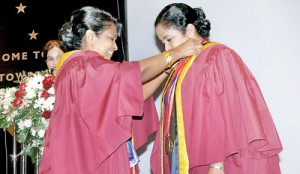Sunday Times 2
College of Community Physicians inducts 21st President
View(s):It was ‘Reproductive Health – the unfinished agenda’ that was the focus when the premier academic body leading the public health service in the country inducted its 21st President.
“The unfinished agenda is a high priority needing early action,” reiterated Dr. Chithramalee de Silva after being inducted as the President of the College of Community Physicians of Sri Lanka on October 3 at the HNB Towers auditorium.

Outgoing President Dr. Paba Palihawadana inducting Dr. Chithramalee de Silva as the new President of the College of Community Physicians. Pic by Mangala Weerasekera
Health Minister Maithripala Sirisena was the chief guest at the function.
Dr. de Silva explained that reproductive health (RH) is a state of complete physical, mental and social well-being and not merely the absence of disease and infirmity, in all matters relating to the reproductive system and to its functions and processes. It implies that people should be able to have a satisfying and safe sex life and have the capability to reproduce and the freedom to decide if, when and how to do so to achieve a healthier life.
RH is a part of sexual and reproductive health and rights and it accounts for 20% of the global burden of ill-health for women and 14% for men, according to her.
With a woman’s ability to access reproductive health and rights being recognised as a cornerstone of her empowerment and a key to sustainable development, Dr. de Silva, who is Deputy Director of Maternal and Child Health at the Health Ministry, detailed the major components of reproductive health as maternal and newborn care; family planning and infertility; adolescent health; issues related to abortion; responsible sexual and reproductive behaviour; gender equity and gender-based violence; reproductive tract infections, sexually-transmitted infections including HIV/AIDS; cancers of the female reproductive system; and menopausal problems.
Quoting figures from the 2012 census, Dr. de Silva said that a significant proportion, 27%, of the 20.3 million population is in the reproductive age-group of 15-49 years. Married women account for 3.2 million to whom appropriate RH services should be geared to provide care.
The areas Dr. de Silva dealt with included:
“Further quality improvement in maternity care in comprehensive emergency obstetric care facilities; prevention of maternal deaths due to post-partum haemorrhage, the need for early action to establish critical care management strategies through multi-disciplinary teams to prevent the rising trend of cardiac deaths and medical problems complicating pregnancies
“Preventing deaths due to unsafe abortions after recognising the importance of addressing the unmet need for family planning by strengthening family planning counselling and services; with adolescence being recognised as a special period of life, provision of better services including family planning to prevent unwanted pregnancies among teenagers
“New strategic interventions for women in the late reproductive age, single parents and sex workers who are “somewhat neglected groups” within the health-care delivery system
She also stressed the need to promote long-term temporary family planning methods to prevent unwanted pregnancies as well as abortions; advocate policy-makers at higher level to protect the reproductive rights of women by liberalising abortion law at least in the case of rape and incest victims and foetuses with severe abnormalities; and focus on men’s health, an area often neglected.

